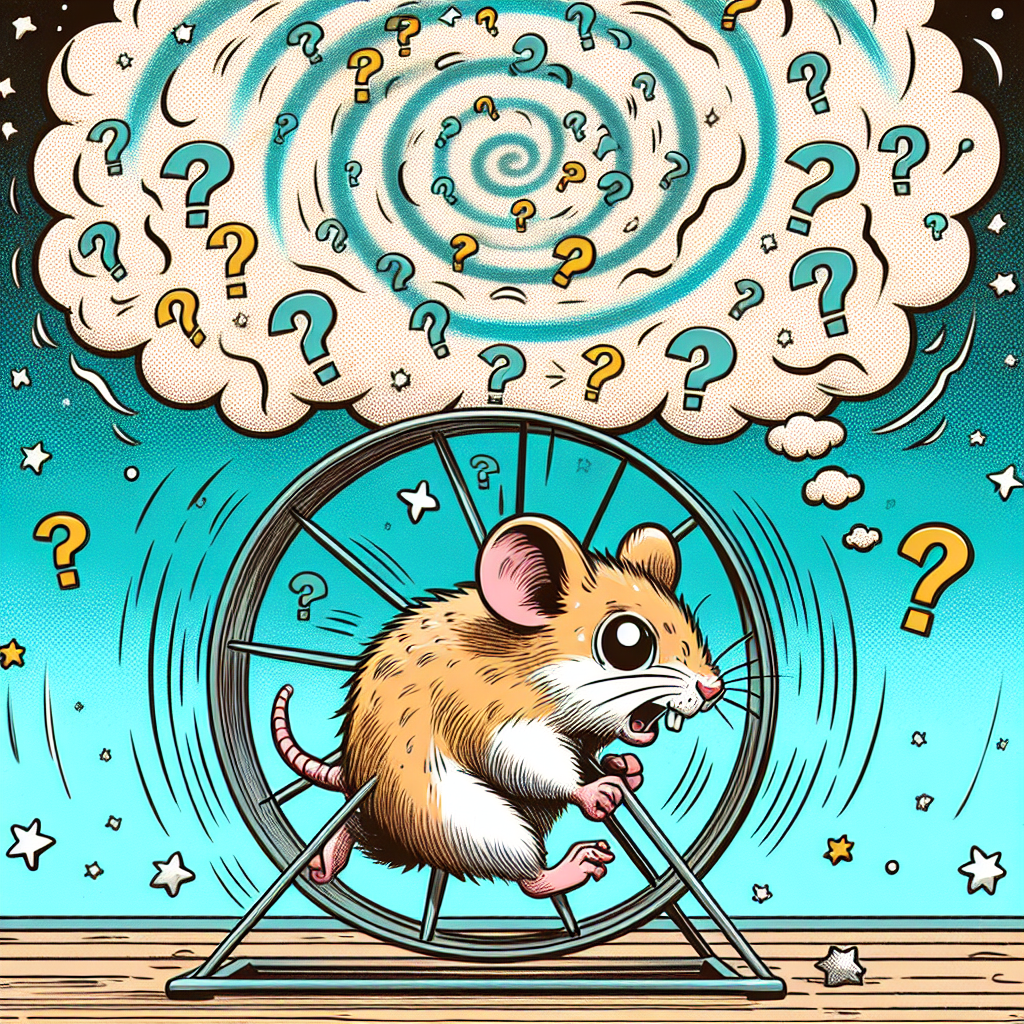Breaking the Overthinking Cycle: ADHD and Mental Loops
Introduction
Welcome to the wild world of ADHD, where thoughts race faster than a caffeinated squirrel! If you’ve ever found yourself tangled in a web of “What ifs?” and “Should I have done that differently?” you might be wondering, does ADHD cause overthinking? Spoiler alert: it often does!
For many individuals with ADHD, overthinking can feel like a mental hamster wheel you’re running hard but getting nowhere. This blog post is your guide to breaking that cycle and understanding how ADHD symptoms intertwine with the chaotic dance of overthinking.
As we dive into this topic, we’ll explore the cognitive processes behind ADHD thought patterns and how they contribute to anxiety and stress. You’ll learn practical strategies for managing those pesky mental loops, whether through mindfulness techniques or behavioral therapy. So grab your favorite snack (preferably something crunchy), settle in, and let’s untangle the web of ADHD and overthinking together!

Understanding ADHD and Overthinking
So, what exactly is ADHD? Attention-Deficit/Hyperactivity Disorder (ADHD) is a neurodevelopmental disorder that affects both children and adults. It’s characterized by a persistent pattern of inattention, hyperactivity, and impulsivity that interferes with functioning or development. Think of it like having a TV remote with a mind of its own sometimes it just flips channels without warning!
Common symptoms of ADHD include:
- Inattention – Struggling to focus on tasks or follow through on instructions.
- Hyperactivity – Constantly feeling restless or fidgety.
- Impulsivity – Making decisions without thinking through the consequences.
Now, let’s dive into the juicy part: does ADHD cause overthinking? You bet it does! People with ADHD often find themselves caught in a web of thoughts, leading to what we call “overthinking.” This phenomenon can be linked to several factors:
- Cognitive processes: The ADHD brain processes information differently, which can lead to spiraling thoughts.
- Anxiety connection: Many individuals with ADHD also experience anxiety, which can exacerbate overthinking. It’s like adding fuel to an already roaring fire!
- Rumination: This is where you replay scenarios in your head like a broken record, often leading to indecision and stress.
Understanding these connections is crucial for managing overthinking with ADHD. By recognizing how ADHD symptoms intertwine with thought patterns, we can start to develop strategies that help break this cycle.
ADHD Thought Patterns and Mental Loops
When we talk about ADHD thought patterns, we’re diving into a wild ride of cognitive processes that can often feel like a hamster wheel spinning but not really going anywhere. So, does ADHD cause overthinking? You bet it does! Let’s break down how this works.
Cognitive Processes in ADHD
Individuals with ADHD often experience a unique set of cognitive processes that can lead to what feels like an endless loop of thoughts. Imagine your brain as a web browser with too many tabs open. Each tab represents a different thought or idea, and every time you try to focus on one, another pops up! This can lead to:
- Difficulty in prioritizing thoughts
- Challenges in filtering out distractions
- A tendency to hyper-focus on certain topics while neglecting others
How ADHD Affects Brain Function
The brain function of someone with ADHD is like a complex machine that sometimes misfires. Neurotransmitters such as dopamine play a big role here. When dopamine levels are off, it can lead to:
- Impulsivity: Jumping from one thought to another without resolution.
- Inattention: Struggling to concentrate on tasks due to overwhelming thoughts.
- Emotional Dysregulation: Heightened emotional responses that complicate decision-making.
The Role of Anxiety in Overthinking with ADHD
Anxiety is the unwelcome guest at the party of ADHD symptoms. When anxiety kicks in, it can exacerbate overthinking, creating a perfect storm for mental loops. The relationship between ADHD and anxiety is complex but often manifests as:
- Rumination: Continuously thinking about past mistakes or future worries.
- Fear of failure: This can paralyze decision-making and lead to procrastination.
- Physical Symptoms: Increased heart rate or sweating when faced with decisions or tasks.

Key Takeaway: Understanding how ADHD affects thought patterns is crucial for managing overthinking. By recognizing these mental loops, individuals can start implementing strategies tailored to their unique cognitive processes.
If you find yourself caught in the whirlwind of ADHD thought patterns and mental loops, remember: you’re not alone! Identifying these patterns is the first step toward breaking free from the cycle of overthinking.
The Impact of Overthinking on Mental Health
Overthinking is like that annoying song stuck in your head that just won’t quit. For those with ADHD, it can spiral into a complex web of thoughts, leading to significant mental health challenges. So, does ADHD cause overthinking? The answer is a resounding yes, and it’s a bit more complicated than just a simple connection.
Emotional Regulation Challenges in ADHD
Individuals with ADHD often struggle with emotional regulation. This means their feelings can be more intense and harder to manage. When overthinking kicks in, it can amplify these emotions, making them feel overwhelming. Imagine trying to juggle flaming torches while riding a unicycle that’s what managing emotional responses while overthinking can feel like!
Stress and Its Relationship with ADHD Overthinking
Overthinking doesn’t just make you feel anxious; it can actually increase stress levels significantly. Studies show that people with ADHD are more susceptible to stress because their brains process information differently. This unique brain function creates a feedback loop where stress feeds into overthinking, leading to even more anxiety. It’s like being stuck on a treadmill that keeps speeding up!
Rumination and Its Effects on Decision Making with ADHD
Rumination is the act of obsessively thinking about something and for those with ADHD, this can be particularly detrimental. When faced with decisions, the tendency to ruminate can lead to paralysis by analysis. You might find yourself caught in an endless loop of “What if?” scenarios instead of making a choice and moving forward.
Key Takeaway: Overthinking exacerbates emotional regulation issues and increases stress levels for individuals with ADHD, creating a cycle that complicates decision-making processes.
The good news? Understanding these impacts is the first step toward breaking the cycle! By recognizing how overthinking interacts with various aspects of mental health in the context of ADHD, individuals can begin to seek strategies tailored specifically for their needs.
Coping Strategies for Managing Overthinking with ADHD
Overthinking can feel like being stuck in a never-ending loop, especially for those with ADHD. It’s like your brain is a DJ stuck on repeat, playing the same anxiety-inducing track over and over. But fear not! There are effective strategies to help break this cycle of ADHD and overthinking.
Mindfulness Techniques for Adults with ADHD
Mindfulness isn’t just a trendy buzzword; it’s a powerful tool for managing those pesky ADHD thought patterns. By practicing mindfulness, you train your brain to focus on the present moment instead of spiraling into a sea of “what-ifs.” Here are some techniques:
- Breathing exercises: Try deep breathing inhale for four counts, hold for four, exhale for four. Repeat until you feel more grounded.
- Body scans: Spend a few minutes mentally scanning your body from head to toe, noticing any tension and consciously relaxing those areas.
- Guided imagery: Picture a serene place a beach, forest, or even your couch and immerse yourself in that calming environment.
Behavioral Therapy Approaches for ADHD Thoughts
Behavioral therapy can be a game-changer when it comes to coping with ADHD and anxiety. This type of therapy helps you identify negative thought patterns and replace them with healthier ones. Here are some approaches:
- Cognitive Behavioral Therapy (CBT): This focuses on changing unhelpful thoughts that contribute to overthinking. It’s like giving your brain a software update!
- Exposure therapy: Gradually facing the situations that trigger your overthinking can help reduce anxiety associated with them.
- Problem-solving therapy: This approach teaches you how to break down overwhelming problems into manageable steps think of it as decluttering your mental space.
Cognitive Behavioral Therapy for Reducing Overthinking in ADHD
Cognitive Behavioral Therapy (CBT) specifically targets the link between thoughts and behaviors, making it particularly effective for managing overthinking in those with ADHD. Here’s how CBT can help:
- Identify triggers: Recognize what situations lead to rumination and develop strategies to address them head-on.
- Challenge negative thoughts: Ask yourself if there’s evidence supporting your anxious thoughts or if they’re just products of an overstimulated mind.
- Set time limits: Allocate specific times during the day to process worries then move on! It’s like scheduling an appointment with your anxiety.

Medication and Therapy Options for ADHD Overthinking
When it comes to managing the question, does ADHD cause overthinking, the answer often lies in a combination of medication and therapy. Think of it as the dynamic duo of mental health like Batman and Robin, but with fewer capes and more brainpower!
Overview of Medication Options for Managing Overthinking in ADHD
Medications can play a significant role in addressing ADHD symptoms, including those pesky thought loops that lead to overthinking. Here’s a quick rundown:
- Stimulants: These are often the first line of defense. Medications like methylphenidate (Ritalin) and amphetamines (Adderall) can help improve focus and reduce impulsivity, which may indirectly lessen overthinking.
- Non-stimulants: For those who don’t respond well to stimulants, options like atomoxetine (Strattera) or guanfacine (Intuniv) can help manage ADHD symptoms without the jittery side effects.
- Antidepressants: Sometimes, managing underlying anxiety or depression with SSRIs or SNRIs can provide relief from overthinking associated with ADHD.
The Role of Therapy in Addressing Cognitive Processes Related to Overthinking
While medication can help tune down the volume on that mental chatter, therapy is where you really learn to dance with your thoughts instead of letting them lead. Here are some effective therapeutic approaches:
- Cognitive Behavioral Therapy (CBT): This therapy focuses on identifying negative thought patterns and replacing them with healthier ones. It’s like giving your brain a makeover!
- Mindfulness-Based Therapy: Mindfulness techniques for adults with ADHD can help ground you in the present moment, reducing the tendency to spiral into overthinking.
- Behavioral Therapy: This approach targets specific behaviors associated with ADHD symptoms, helping you develop practical skills for managing impulsivity and enhancing emotional regulation.
Combining Medication and Behavioral Strategies for Optimal Results
The magic happens when you combine medication with effective therapy. Think of it as having both a map and a compass while exploring uncharted territory much less likely to get lost! Here are some tips for creating your personal action plan:
- Consultation: Regular check-ins with your healthcare provider to adjust medications as needed based on your experiences.
- Integration: Use insights from therapy sessions to inform how you approach medication management like using a cheat sheet during an exam!
- Support Systems: Engage family or friends in your journey; their support can be invaluable when tackling ADHD symptoms together.
Practical Techniques to Reduce Overthinking in Daily Life
So, you’re caught in the whirlwind of ADHD and overthinking, and it feels like your brain is that one friend who just can’t stop talking at a party. Fear not! Here are some practical techniques to help you manage those pesky thought loops.
1. Relaxation Techniques
First up, let’s talk about relaxation techniques. Think of them as the pause button on your mental playlist. Here are a few options:
- Deep Breathing: Inhale for four counts, hold for four, exhale for four. Repeat until your mind stops racing.
- Progressive Muscle Relaxation: Tense each muscle group for five seconds, then relax. It’s like giving your body a mini-vacation.
- Guided Imagery: Picture a serene beach or a cozy cabin in the woods somewhere your thoughts can take a break.
2. Focus and Concentration Tips
Next, let’s tackle those focus issues in ADHD that often lead to overthinking. Try these strategies:
- Pomodoro Technique: Work for 25 minutes, then take a five-minute break. It’s like sprinting through your tasks with little pit stops!
- Limit Distractions: Create a distraction-free zone by turning off notifications and decluttering your workspace your brain will thank you!
- Use Visual Aids: Color-coded calendars or sticky notes can help keep you organized and focused on what truly matters.
3. Enhancing Mental Clarity
If you’re feeling foggy, here are some strategies to boost mental clarity and improve executive function:
- Mind Mapping: Create visual diagrams of your thoughts to organize ideas and see connections clearly think of it as brainstorming on steroids!
- Regular Exercise: Physical activity releases endorphins that sharpen focus and reduce stress plus, it’s an excellent excuse to jam out to your favorite tunes!
- Healthy Eating: Fueling your body with nutritious foods can improve brain function. Snack smartly with nuts or berries instead of sugary treats.

Conclusion: Embracing a Balanced Mindset with ADHD
As we wrap up our deep dive into the whirlwind world of ADHD and overthinking, it’s clear that understanding how ADHD influences our thought patterns is crucial. So, does ADHD cause overthinking? The answer is a resounding yes! But it’s not just about the condition itself; it’s about how we choose to navigate these mental loops.
Many adults with ADHD find themselves caught in a cycle of rumination and anxiety, leading to stress that can feel overwhelming. This is where embracing a balanced mindset becomes essential. Think of your brain as a busy coffee shop sometimes, it’s buzzing with energy and creativity, while other times, it feels like the barista forgot to brew the coffee altogether. The key is learning to manage those busy hours effectively.
Strategies for a Balanced Mindset
- Mindfulness: Techniques such as meditation can help ground your thoughts and reduce anxiety.
- Cognitive Behavioral Therapy (CBT): This approach helps reframe negative thought patterns associated with ADHD.
- Structured Decision-Making: Use lists or flowcharts to simplify choices and minimize overwhelm.
- Relaxation Techniques: Incorporate breathing exercises or gentle stretching into your routine to ease stress.
The journey to managing ADHD symptoms like overthinking is not a sprint; it’s more of a marathon. You might stumble along the way, but each step brings you closer to clarity and calmness. Remember, it’s perfectly okay to seek support from professionals who understand the nuances of ADHD and can provide tailored strategies for coping with those pesky thought patterns.
If you find yourself spiraling into overthinking, take a moment to pause and breathe. Reflect on what strategies resonate with you whether it’s jotting down thoughts in a journal or practicing mindfulness techniques specifically designed for adults with ADHD. Each small action can lead to significant change!
In conclusion, embracing a balanced mindset involves recognizing your unique cognitive processes and finding ways to channel them positively. With the right tools and support, you can break free from the chains of overthinking and lead a fulfilling life despite ADHD’s challenges.


